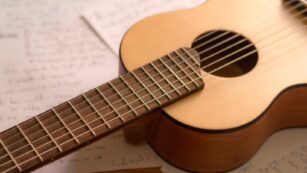Embarking on a songwriting course can be a transformative journey for anyone looking to refine their musical craft or carve out a space in the competitive world of music. These courses are designed not only to enhance one’s lyrical prowess but also to deepen understanding of musical composition and emotional expression through melodies.
Songwriting Course
 A songwriting course provides aspiring songwriters the expertise and support needed to refine their skills and stand out in the music industry. It offers a comprehensive approach to song creation, focusing on both technical skills and creative expression.
A songwriting course provides aspiring songwriters the expertise and support needed to refine their skills and stand out in the music industry. It offers a comprehensive approach to song creation, focusing on both technical skills and creative expression.
A songwriting course facilitates creativity, encouraging students to explore diverse musical styles and thematic content. It provides tools such as brainstorming techniques, melodic structuring, and lyrical analysis, helping participants to unlock new ideas and find their unique voice. For example, tasks like writing prompts and collaborative projects allow for experimentation and growth, making each participant’s creative journey unique and productive.
Developing Songwriting Discipline
Consistency plays a critical role in mastering songwriting, and a structured course aids in cultivating that discipline. Regular assignments, deadlines, and feedback sessions ensure that students remain engaged and steadily improve their craft. This structured environment helps participants to develop a routine, transforming sporadic creativity into a disciplined art form. For instance, weekly song feedbacks and critique sessions not only refine skills but also build the persistence necessary for success in the music industry.
Key Components of a Songwriting Course
A songwriting course equips participants with essential skills and knowledge across various aspects of creating music. It delves into structured teaching methods that cover composition, lyricism, and theoretical applications.
Structure and Form in Songwriting
 Understanding the structure and form is fundamental in songwriting. A typical course outlines elements like verses, choruses, bridges, and hooks. Participants learn to construct a song’s skeleton, ensuring it flows seamlessly and captures the listener’s attention. Effective use involves mastering the placement of each section to enhance a song’s emotional impact and memorability. Instructors provide examples of popular songs, dissecting their structures to illustrate successful songwriting techniques.
Understanding the structure and form is fundamental in songwriting. A typical course outlines elements like verses, choruses, bridges, and hooks. Participants learn to construct a song’s skeleton, ensuring it flows seamlessly and captures the listener’s attention. Effective use involves mastering the placement of each section to enhance a song’s emotional impact and memorability. Instructors provide examples of popular songs, dissecting their structures to illustrate successful songwriting techniques.
Lyric Writing Techniques
Courses on lyric writing focus on crafting meaningful and relatable lyrics. They explore various writing methods such as storytelling, metaphor usage, and emotive language. Participants learn to write lyrics that resonate with diverse audiences, ensuring emotional depth and connection. In sessions, students practice writing lyrics in different styles, from romantic to protest themes, gaining feedback from peers and seasoned songwriters. This part of the course enhances a songwriter’s ability to express ideas compellingly.
Using Music Theory in Songwriting
Music theory serves as the backbone of effective songwriting. Courses incorporate basic to advanced music theory principles to help songwriters understand how different chords, melodies, and rhythms work together. Learning these concepts allows participants to experiment with innovative sounds and harmonies, pushing creative boundaries. Real-world applications of music theory in songwriting include crafting chord progressions that evoke specific emotions or determining the best key for a song’s vocal range.
Choosing the Right Songwriting Course
Selecting the appropriate songwriting course involves careful consideration of several key factors, ensuring a match between the individual’s goals and the offerings of the course.
Assessing Personal Goals and Aspirations
 Understanding personal goals and aspirations is crucial when choosing a songwriting course. Individuals seeking to enhance their lyrical abilities might prefer courses with a strong focus on lyric writing techniques, while those aiming to excel in musical composition could search for courses that emphasize music theory and melody construction. For example, a songwriter interested in pop music might choose a different course than one focused on jazz or classical music composition.
Understanding personal goals and aspirations is crucial when choosing a songwriting course. Individuals seeking to enhance their lyrical abilities might prefer courses with a strong focus on lyric writing techniques, while those aiming to excel in musical composition could search for courses that emphasize music theory and melody construction. For example, a songwriter interested in pop music might choose a different course than one focused on jazz or classical music composition.
Examining Course Content and Structure
Exploring the course content and structure ensures the program meets specific learning preferences and educational needs. Prospective students should look for courses that include comprehensive modules on lyricism, composition, and music theory. Details such as the presence of hands-on projects, frequency of assignments, and type of feedback (peer or instructor-led) also play a significant role in determining the course’s suitability.
Considering Instructor Credentials and Experience
The experience and credentials of instructors can significantly impact the learning experience in a songwriting course. Prospective students should seek out courses taught by instructors who not only have professional experience in songwriting but also possess a strong educational background in music theory.

